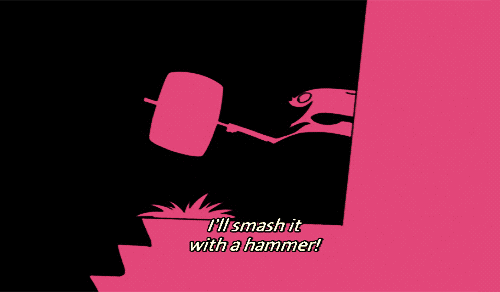On villainization & ambush ambivalence
The peaceful adulting of choosing alignment over long-distance motives
Yzma from “The Emperor’s New Groove” (IFYKYK) // Photo credit: Walt Disney Pictures
I’ve been visiting a family member who enjoys watching legal dramas. Because analyzing the narratives is far more entertaining than the acting, one of the patterns I’ve noticed is the serial villainization of characters as investigators attempt to determine the true perpetrator. The character assassination designed to establish guilt focuses on a motive, be it as pedestrian as the desire for more power, or as pathological as the desire for more pain.
Through the ongoing processing of the career that I recently left behind, I continue to recognize old patterns of response behavior. Villainization shows up in the historical narratives of my tech tenor in response to challenging people and their actions. I would assign motives to the behavior of obstructive or difficult people, most likely as a means to try and cope with confusion or fear. Having a motive probably helped me pull together tactics for reaction, choreographing my moves based on what I had assumed their intent to be. But of course it didn't truly help in the long term, it just reinforced a narrative of assigned roles, locking everyone into a boring TV drama begging for a channel change.
This week I shared this with one of my clients and she shrieked in recognition. I told her that I was happy to see this in the rearview mirror, and that now I don’t spend much time trying to decipher the possible motives of others. Instead I focus on how to stay in alignment with my goals and purpose, and understand where my interaction with the other person fits with all that. She countered quickly. “But I like to know their motives so that I can prepare for my interactions with them! I want to know how to show up, how to come to the fight!”
“Yeah,” I verbally nodded. “I do get it. You don't want to show up to an ambush where you were expecting a tea ceremony. But what if it were all the same to you? What if you were equally prepared for tea or coordinated fire? What if you didn’t prepare for those situations any differently? What if you only focused on alignment and fit?”
The discussion got rich as chocolate from that point. I shared with her a quote I recently read from writer Alan Jones about having the ability "to smell a rat without allowing your ability to discern deception sour your vision of the glory and joy that is everyone's birthright." Just that. Discerning deception doesn’t have to mean damning or demonizing. It can just be noticing … a lack of alignment, an unexpected energy, an opportunity, an ambush disguised as a tea ceremony, an invitation to turn a play for control into a playdate.
In speaking with a close friend who I’ve worked with a number of times over the years, I decided to put together a set of reflections based on villainization patterns that might show up in the workplace. I’d love to hear from folks about where this rings true, is helpful or not, and where it might have application in other areas of life.
When you are tempted to villainize …
🌱 Take pen to paper (or keystroke to screen, whatever) and list out the behaviors that you find troubling, challenging, obstructive, etc. Get it out of your mind so that you can truly look at the struggle.
🌱 Once you have your data, make a short list of the 3-5 ways that the situation is having a real impact on your ability to do your job. Shift away from “Yzma is being a dick to me in meetings” to “when I’m interrupted in meetings I’m unable to share information that the rest of leadership has asked to hear and understand in order to inform important decisions.”
🌱 Write down why it’s important for you and this person to be aligned. If you work at the same place, your fates are tied - you both share a commitment to the success of the endeavor that you support by being there. So what goals do you share? What do you have in common?
🌱 Flex deeply for compassion. Even if this person has nefarious motives, it’s important to remind ourselves that they are another human locked in the log flume of survival and they are just reacting to their own system of triggers and fears. And since we are all aboard the compassion train, we can see their struggle for what it is. Can’t we?
🌱 I can’t make a blanket recommendation about how to proceed, or when, where, how, or if to address things. But Situation, Behavior, Impact approaches are always a healthy option, and of course boundaries are golden.
If you witness attempted villainization …
🌼 I’m thinking specifically about managers, leaders, or colleagues who bear witness to a struggling soul’s impulse to expose motives in order to ask for help or feel supported. It’s tough to see folks who we care about struggle, and we can help them pull out of a tailspin.
🌼 Listen compassionately as they weave the bloody crime-scene narrative. Let them get it all out. Validate their struggle.
🌼 When the moment is righter, ask them if it truly matters what the other person's motives are. Ask them if they can take the perspective of focusing solely on what they need to accomplish with this person and if they can work to create a safer environment to accomplish that.
🌼 Suggest that they do some of the things listed in the above section.
🌼 You aren’t their therapist but you can still support their move towards a calm, centered, awareness.
If villainization is happening to you …
🍄 First and foremost, remember all of your lessons from Martha Beck and ask yourself: Is this true? Is what this person saying about me actually true? Then, stand steadfast in your truth.
🍄 Acknowledge the other person’s struggle. When appropriate, be open to listening in order to gain insight into where the lack of alignment might be coming from.
🍄 Ask if the other person is willing to give you feedback using the situation, behavior, impact model and truly be open to understanding your role in whatever the situation is and how the two of you might work together to gain alignment.
🍄 If there’s something for you to own in all this, model maturity by owning it. As you discuss, if things drift off course bring the interaction back to your shared goals.
🍄 Compassion begets compassion.




